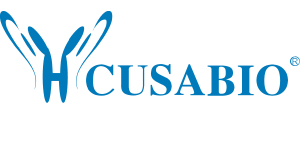Recombinant Human Membrane cofactor protein (CD46), partial (Active)
Recombinant Human Membrane cofactor protein (CD46), partial (Active)
Artikelnummer
CSB-MP004939HU-20
Verpackungseinheit
20 µg
Hersteller
Cusabio
Verfügbarkeit:
wird geladen...
Preis wird geladen...
Research Areas: Cancer
Uniprot: P15529
Buffer: Lyophilized from a 0.2 μm filtered PBS, 6% Trehalose, pH 7.4
Form: Lyophilized powder
Tag Info: C-terminal hFc-tagged
Purity: Greater than 90% as determined by SDS-PAGE.
Notes: Repeated freezing and thawing is not recommended. Store working aliquots at 4℃ for up to one week.
Molecular Weight: 61.6 kDa
Gene Names: CD46
Organism: Homo sapiens (Human)
Source: Mammalian cell
Expression Region: 35-328aa
Protein Length: Partial
Target Protein Sequence: CEEPPTFEAMELIGKPKPYYEIGERVDYKCKKGYFYIPPLATHTICDRNHTWLPVSDDACYRETCPYIRDPLNGQAVPANGTYEFGYQMHFICNEGYYLIGEEILYCELKGSVAIWSGKPPICEKVLCTPPPKIKNGKHTFSEVEVFEYLDAVTYSCDPAPGPDPFSLIGESTIYCGDNSVWSRAAPECKVVKCRFPVVENGKQISGFGKKFYYKATVMFECDKGFYLDGSDTIVCDSNSTWDPPVPKCLKVLPPSSTKPPALSHSVSTSSTTKSPASSASGPRPTYKPPVSNY
Endotoxin: Less than 1.0 EU/ug as determined by LAL method.
Biological_Activity: Measured by its binding ability in a functional ELISA. Immobilized CD46 at 2 μg/ml can bind Anti-CD46 rabbit monoclonal antibody, the EC50 of human CD46 protein is 0.8333-1.054 ng/ml.
Relevance: Acts as a cofactor for complement factor I, a serine protease which protects autologous cells against complement-mediated injury by cleaving C3b and C4b deposited on host tissue. May be involved in the fusion of the spermatozoa with the oocyte during fertilization. Also acts as a costimulatory factor for T-cells which induces the differentiation of CD4+ into T-regulatory 1 cells. T-regulatory 1 cells suppress immune responses by secreting interleukin-10, and therefore are thought to prevent autoimmunity.(Microbial infection) A number of viral and bacterial pathogens seem to bind MCP in order to exploit its immune regulation property and directly induce an immunosuppressive phenotype in T-cells.(Microbial infection) Acts as a receptor for Adenovirus subgroup B2 and Ad3.(Microbial infection) Acts as a receptor for cultured Measles virus.(Microbial infection) Acts as a receptor for Herpesvirus 6/HHV-6.(Microbial infection) May act as a receptor for pathogenic bacteria Neisseria and Streptococcus pyogenes (PubMed:7708671, PubMed:9379894, PubMed:11260136, PubMed:11971006).
Uniprot: P15529
Buffer: Lyophilized from a 0.2 μm filtered PBS, 6% Trehalose, pH 7.4
Form: Lyophilized powder
Tag Info: C-terminal hFc-tagged
Purity: Greater than 90% as determined by SDS-PAGE.
Notes: Repeated freezing and thawing is not recommended. Store working aliquots at 4℃ for up to one week.
Molecular Weight: 61.6 kDa
Gene Names: CD46
Organism: Homo sapiens (Human)
Source: Mammalian cell
Expression Region: 35-328aa
Protein Length: Partial
Target Protein Sequence: CEEPPTFEAMELIGKPKPYYEIGERVDYKCKKGYFYIPPLATHTICDRNHTWLPVSDDACYRETCPYIRDPLNGQAVPANGTYEFGYQMHFICNEGYYLIGEEILYCELKGSVAIWSGKPPICEKVLCTPPPKIKNGKHTFSEVEVFEYLDAVTYSCDPAPGPDPFSLIGESTIYCGDNSVWSRAAPECKVVKCRFPVVENGKQISGFGKKFYYKATVMFECDKGFYLDGSDTIVCDSNSTWDPPVPKCLKVLPPSSTKPPALSHSVSTSSTTKSPASSASGPRPTYKPPVSNY
Endotoxin: Less than 1.0 EU/ug as determined by LAL method.
Biological_Activity: Measured by its binding ability in a functional ELISA. Immobilized CD46 at 2 μg/ml can bind Anti-CD46 rabbit monoclonal antibody, the EC50 of human CD46 protein is 0.8333-1.054 ng/ml.
Relevance: Acts as a cofactor for complement factor I, a serine protease which protects autologous cells against complement-mediated injury by cleaving C3b and C4b deposited on host tissue. May be involved in the fusion of the spermatozoa with the oocyte during fertilization. Also acts as a costimulatory factor for T-cells which induces the differentiation of CD4+ into T-regulatory 1 cells. T-regulatory 1 cells suppress immune responses by secreting interleukin-10, and therefore are thought to prevent autoimmunity.(Microbial infection) A number of viral and bacterial pathogens seem to bind MCP in order to exploit its immune regulation property and directly induce an immunosuppressive phenotype in T-cells.(Microbial infection) Acts as a receptor for Adenovirus subgroup B2 and Ad3.(Microbial infection) Acts as a receptor for cultured Measles virus.(Microbial infection) Acts as a receptor for Herpesvirus 6/HHV-6.(Microbial infection) May act as a receptor for pathogenic bacteria Neisseria and Streptococcus pyogenes (PubMed:7708671, PubMed:9379894, PubMed:11260136, PubMed:11971006).

 English
English










